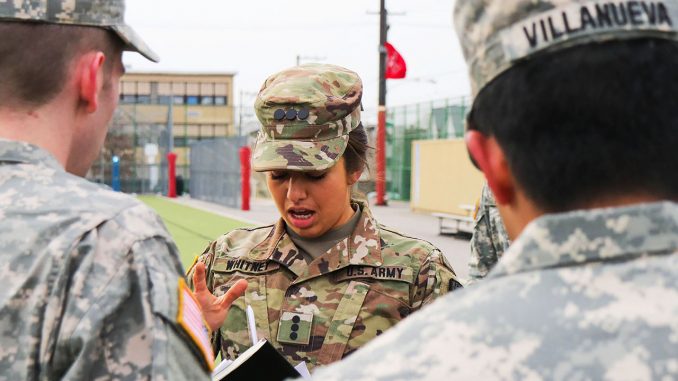
Although Hannah Whitney comes from a family of soldiers, she didn’t originally want to join the military.
As a child, her father was in the Army and was deployed multiple times to countries like Bosnia, Afghanistan and Lithuania. She was home-schooled until high school and said the deployment took a toll on her family.
“But there was a point where that kind of changed and I was like, ‘I think it’s really important for everyone to serve their country in any way possible,’ and if the military is my way, that’s the way I wanted to do it,” said Whitney, a senior criminal justice major and a cadet for Temple’s Reserve Officers Training Corps.
Whitney’s mother was in the Army, too. Her mom originally wanted to work in one of the combat arms branches, but she was not allowed because of her gender. She instead joined the military police, which is law enforcement within the army, and served in South Korea and Fort Carson in Colorado.
Before 2015, women were permitted in one of the combat arms branches — the branches of the Army that engage in direct combat. In January 2016, former U.S. Secretary of Defense Ashton Carter declared all branches and facets of the military open to anyone who wanted to serve.
Since 2016, women from Temple’s ROTC program have commissioned into combat arms positions and graduated from the basic officer leadership course for these fields each year.
ROTC is a program that trains students in high schools and universities to later become officers in the U.S. armed forces.
In Temple’s ROTC program, 20 percent of the students are women. This is higher than the percentage of women in the Army, which is currently 13.6 percent.
As one of the leaders of ROTC at Temple, Lt. Col. Keith Benedict prides himself on the accomplishments of cadets like Whitney.
“The decision for women to enter into combat arms is one that certainly can’t be taken lightly, in the sense of, the core mission…for our military is to defend the nation,” Benedict said. “And it’s about readiness and capability to do that.”
Benedict also thinks that one of the main reasons for the decision was to make sure military skills aren’t gender specific, but focused on a person’s capability.
Whitney is the assistant operations and training officer with ROTC, which puts her in charge of planning training events within the battalion. Last year, she was company commander and responsible for half the junior cadets last semester.
This semester, she works with the operations team, which continues the military skill-building within the organization, like field exercises in marksmanship.
Combat arms includes rigorous field work that requires a great deal of physical prowess. The training that goes into it is often long and physically demanding. Benedict said since women have joined, they have brought important viewpoints and support to the team.
“The perspective that women provide to the all-volunteer force has been invaluable since the beginning, since we’ve been gender integrating the force increasingly,” Benedict said.

“Creative friction within teams occurs when you have diverse backgrounds, perspectives and problem-solving approaches,” Benedict added. “Previously barring over 50 percent of the population from being part of the critical decisions-making processes made by combat arms leaders…impaired our ability to leverage the nation’s collective talents, inhibiting our overall readiness.”
Whitney didn’t officially make the decision to join combat arms until she visited Fort Knox in Kentucky for training in the summer.
“[At] one of the conferences I was able to attend, there was actually the third female who [ever] attended ranger school in the past and that was a huge, huge deal for me, just like hearing her talk about her experiences,” Whitney said. “I was like, on the bridge of, ‘Do I want to do this, do I not?’ and it was just a big deal for me.”
After Whitney graduates in May, she will go to the Armor Basic Officer Leadership course in Fort Benning in Georgia.
With her contract, Whitney will commission as an active duty officer and automatically enter the Army for eight years. If she decides to leave the Army after her contract ends, she hopes to work for the FBI and focus on human trafficking.
In ROTC, Whitney said she doesn’t feel that she doesn’t experience much pushback for her gender.
She said people’s success in the program is determined by their physical ability and dedication, not gender.
“I think it depends on the setting you’re in, and the way you’re presented and the way you present yourself,” Whitney added. “Not just from a gender perspective, but like any perspective, if someone doesn’t think you’re competent, by just the way you conduct yourself, you may not be seen as competent in that aspect.”


Be the first to comment